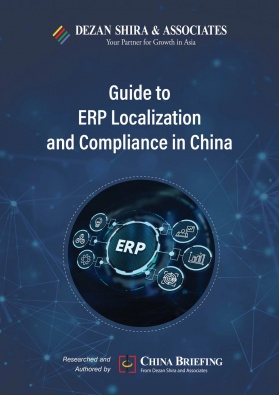Navigating China’s Evolving Approach to Human Genetic Resources: Insights on Regulatory Changes
China’s management of human genetic resources has been transferred the to the National Health Commission, aiming to streamline regulations and foster biotech innovation by balancing oversight and reducing bureaucratic burdens. This shift is expected to enhance international collaboration, attract foreign investment, and expedite drug development in China.
The State Council has issued the Decision of the State Council on Amending and Repealing Part of the Administrative Regulations (State Order No. 777), which transferred the management authority of human genetic resources from the Ministry of Science and Technology (MOST) to the National Health Commission (NHC), among other adjustments. The change took effect on May 1, 2024.
This article examines the implications of recent regulatory changes and provides insights into the shifting landscape of human genetic resources regulation in China. By reviewing the current authority structure and anticipating future revisions, we aim to offer valuable perspectives for clients and industry peers navigating this dynamic field
Background on China’s human genetic resources
Human genetic resources include materials such as organs, tissues, and cells containing substances such as the human genome and genes, along with related data. These resources play a critical role in developing new drugs and therapies, hold significant economic value, and are central to national biosecurity. China is overhauling its decade-old regulatory system governing human genetic resources to foster biotech innovation.
The existing regulations, dating back to 2015, impose strict supervision and lengthy approval processes for collecting, preserving, transporting, and utilizing human biological materials. These procedures have posed challenges for the pharmaceutical industry, which faces global competition in getting new drugs approved and to market.
In addition to companies, academic institutions also grapple with these stringent regulations. Since 2019, research involving human genetic resources must be registered for international cooperation before publication. However, vague definitions and stringent standards have created uncertainties. Experts advocate for easing these regulations to strike a balance between supervision and scientific research development.
China’s evolving regulations on human genetic resources
China’s journey in regulating human genetic resources has seen significant developments over the years.
China initiated supervision of human genetic resources in 1998 through interim measures. In 2015, the country established its first comprehensive regulatory framework, which mandates months-long approvals for the collection, preservation, transportation, and utilization of human biological materials. These stringent regulations present challenges, particularly for the innovative drug industry, where companies race to get drugs approved and bring products to market.
In 2019, China issued the Regulations on the Management of Human Genetic Resources (HGR Regulations). These regulations require international collaborations to adhere to human genetic resources guidelines. Especially certain materials – such as whole blood, tissue biopsies, and genetic sequencing data – are subject to increased scrutiny. Licensing and compliance vary based on the activity and nature of the collaboration. The regulations mandate a rigorous pre-entry application and licensing process, ongoing reporting, audits, and internal controls to ensure compliance. Later in 2020, the Biosafety Law was promulgated, serving as the sector’s overarching convention.
In June 2023, the Implementation Rules for the Management Regulations of Human Genetic Resources (the HGR Implementation Rules, or 2023 guidelines) were introduced, building upon the existing regulatory framework by incorporating industry feedback and easing certain requirements. The HCG Implementation Rules provided further clarifications, resulting in a reduction of strict requirements and an optimization of the review process for human genetic resources. As a result, the workload associated with these reviews has been somewhat alleviated.
Despite progress in regulatory frameworks, Chinese drug developers continue to encounter additional human genetic resource reviews. These reviews can impede the pace of new drug research and development, potentially widening the gap between China and other countries, as noted by industry insiders.
Recent changes and future developments
Signs of change emerged in March 2023 when a national legislative meeting announced a plan to transfer supervision of human genetic material to the NHC. Subsequently, in July, the MOST closed its 25-year-old Genetic Resources Office, signaling a policy shift towards public health. By May 2024, authority over human resources had fully transitioned to the NHC.
Between late 2023 and early 2024, the NHC engaged in intensive discussions with experts and industry representatives, resulting in a consensus on streamlining administration and deregulation. Specifically, the NHC focused on revising rules for the use and management of human genetic resources. The goal was to streamline procedures, enhance regulatory efficiency, and invigorate scientific research and the biopharmaceutical industry. The guiding principle behind these changes was to “regulate where necessary and relax where possible,” aiming to strike a balance between effective oversight and avoiding unnecessary regulatory burdens.
The primary focus of the reform is to revise the 2023 HCG Implementation Rules and address issues related to regulatory overreach and imprecise risk control. Officials and experts have engaged in discussions regarding changes in several key areas:
- Threshold for project approval: Experts recommended increasing the threshold for administrative approval for human genetic resource collection projects from 3,000 to 10,000 samples. This change would reduce the burden on pharmaceutical companies and allow smaller-scale research projects to avoid regulatory review.
- Definition of “foreign entities”: Clarifying the definition of “foreign entities” subject to administrative review is crucial. The 2019 regulations defined these as foreign institutions established or controlled by foreign organizations or individuals. However, the lack of a clear definition of “actual control” cause issues for biotech startups receiving overseas investments and returning Chinese scientists. The 2023 guidelines improved this by stating entities with less than 50 percent foreign ownership and no significant foreign influence are not considered “foreign entities.” Experts propose further relaxing this definition to include institutions established by Hong Kong and Macao entities as Chinese entities, enhancing the region’s attractiveness to foreign investment. However, practical implementation may still require a more precise definition.
- Regulatory provisions and application process: Experts also recommend revising overlapping and contradictory regulations and optimizing the application process for enterprises and research institutions, in a move to create a more precise, efficient, and scientifically sound regulatory framework.
- Data sharing: Current rules require a security review for cross-border sharing of human genetic information related to public health, national security, or public interests. However, specific procedures and criteria are lacking, leading to uncertainty for companies and complicating project timelines. Domestically, “data islands” hinder data sharing and innovation in drug and gene therapy development among institutions. Regulators may need to ease restrictions to balance biosecurity protection with industry development.
Biosecurity is crucial in global power dynamics. Given the existing administrative and regulatory challenges, significant changes in supervision and administration will need deeper discussions and substantial legal reforms. Legal experts anticipate that future revisions will likely encompass the Biosafety Law, Implementing Rules, and administrative guidelines to harmonize various legal documents. These revisions should aim to streamline administrative procedures and boost the biopharmaceutical industry. Feedback from practical implementation should guide dynamic adjustments, ensuring prudent progress while maintaining industry patience.
Pharmaceutical market in China
China’s pharmaceutical market significantly lags behind North America, accounting for just 8.1 percent of global sales in 2022 compared to 52.3 percent for the US and Canada, according to the European Federation of Pharmaceutical Industries and Associations (EFPIA). China’s pharmaceutical R&D expenditure was US$13 billion (RMB 94.17 billion) in 2021, whereas the US spent US$76.04 billion (RMB 550.8 billion). In biologics, China’s sector was valued at up to US$6.2 billion (RMB 44.91 billion) in 2019, far less than the US market’s US$118 billion (RMB 854.73 billion), as reported to the US-China Economic and Security Review Commission.
Despite lower R&D spending, China is rapidly closing the gap, with an annual growth rate of 15.6 percent between 2018 and 2022, surpassing the US’s 9.4 percent and Europe’s 4.6 percent, according to EFPIA. China’s innovative drug market is projected to grow from US$20 billion (RMB 144.87 billion) in 2022 to US$50 billion (RMB 362.18 billion) by 2028.
How will the policy shifts impact China’s biotech market?
Managing human genetic resources is a global issue influenced by geopolitical, economic, technological, and industrial factors. National security concerns often drive tighter regulations. Industry experts stress the need for precise definitions of “biosecurity” and “gene weapons” to avoid regulatory overreach and public misunderstanding. Balancing security with the efficient use of biomedical data to foster social progress and economic development remains a global challenge.
Exports of genetic data and materials and foreign partnerships, have faced regulatory scrutiny, posing compliance challenges for businesses. Biotech startups frequently receive foreign investment, introduce new technologies through equity swaps, and raise capital via overseas share sales. As international biomedical research and business grow more data-intensive, China’s stringent regulatory controls have become a constraint, prompting regulators to ease restrictions to balance biosecurity protection with industry development and innovation.
Easing regulations on human genetic resources in China could greatly benefit foreign businesses by facilitating collaborations with Chinese firms and researchers. It would attract more international investments due to reduced regulatory burdens and lower compliance costs, accelerating research and development activities. Improved access to Chinese genetic data would enhance the development of new drugs tailored to the Chinese market. Streamlined operations and reduced delays in regulatory reviews would allow products to reach the market faster, spurring innovation and minimizing compliance risks. Overall, these changes would create a more collaborative, efficient, and attractive environment for biotechnological and pharmaceutical innovation in the country, along with the management of China’s human genetic resources.
About Us
China Briefing is one of five regional Asia Briefing publications, supported by Dezan Shira & Associates. For a complimentary subscription to China Briefing’s content products, please click here.
Dezan Shira & Associates assists foreign investors into China and has done so since 1992 through offices in Beijing, Tianjin, Dalian, Qingdao, Shanghai, Hangzhou, Ningbo, Suzhou, Guangzhou, Dongguan, Haikou, Zhongshan, Shenzhen, and Hong Kong. We also have offices in Vietnam, Indonesia, Singapore, United States, Germany, Italy, India, and Dubai (UAE) and partner firms assisting foreign investors in The Philippines, Malaysia, Thailand, Bangladesh, and Australia. For assistance in China, please contact the firm at china@dezshira.com or visit our website at www.dezshira.com.
- Previous Article China Monthly Tax Brief: May 2024
- Next Article China’s Enhanced Beneficiary Owner Filing System: Key Points of New Measures








